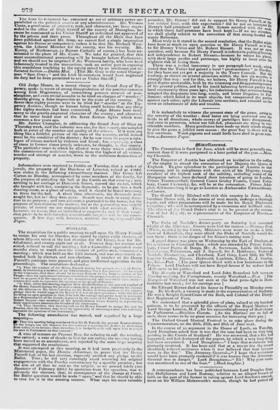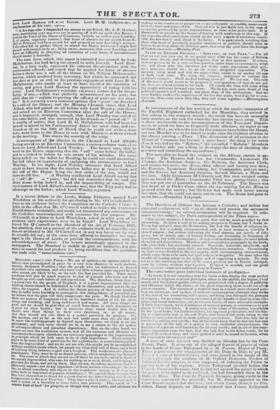A correspondence has been published between Lord Douglas Gor- don
Hallyburton and Lord Ramsay, relative to an alleged breach of faith on the part of the former in voting against Lord Sandon's amend- ment on Sir William Molesworth's motion, though he had paired off
with Lotd Ramsay till atter Easter. Lord D. G. llallyhulio,i,.iii explanation of his vote, says- " A few days after I despatched my answer to our friend, Mr: J. F. Gordon's note, mentioning your actioiesta-tice In pairing off. with me until after Easter, I din the Votes of the House of Commons, (which, as well as your Lordship. Ieaof course, regularly receive.) that leave of absence for one month from the .2'3,1 of February had been Toyed for and granted on your Lordship's account. I therefore felt at perfect liberty to attend the Home whenever I !might find myself well enough to do so; being aware, moreover, that your Lord co
ship uld base no difficulty in obtaining an extension of your leave, if circumstances should render it desirable."
The note from which this paper is extracted was penned by Lady Ballyburton, her lord being too unwell to write himself. Lord Ram- say, in a long reply, expressed his extreme dissatisfaction with the explanation offered; and stated that he applied for leave of absence because there was a call of the House on Sir William Mulesworth's motion, which rendered leave necessary, but which, he contended. did not alter or put an end to his previous engagement with Loin D. G. Bellybutton, who ought at least to have signified his intention of voting, and given Lord Rams. ity the opportunity of voting with his prity arty. Lord Bellybutton's rejoinder expresses sorrow for the irregu- je any,—which was perfectly unintentiolial on his part ;t but , adds, that his " notions respecting the efficacy of pairs are not singu. ler." It is certainly a very common opinion that " pairs" are dissolved by a call of the House; and the Morning Chronicle states that Lord Alford, who had paired on all ballots with Lord Worsley, was drawn and served on an Election Committee after the call of the House; end it happened, strangely enough, that Lord Worsley was called on the same ballot, and was answered by his friends as .. paired off." It is worthy of notice, that Lord D. G. liallybitrton, ho had been too unwell toattend to Ins Parliamentary duties for some time, and con- tinued so ill on the 13th of March that he could not write a short note, went down to the House to vote with Ministers at three o'clock in the morning. This shows the severity of the whip.
In consequence of the allusion in the Chronicle to Lord Alford's having wiled on an Election Committee, a correspondence took plaee yew/ en Lord Alford and Lord Worsley. The former says, that he went to the House supposing that the " call" crone before the ballot, and was locked in before he was aware of his mistake. His name being called on the ballot for Reading, he could not avoid answering ;
but had taken an opportunity of explaining the circumstance to Lord Worsley. In his reply, Lord Worsley intimates that Lord Alford ought to have known that the election ballot was at four o'clock, and the call of the House. being the first order of the day, would not come on till five. ' .11 Worsley recollected Lord Alford saying that
a " call" die- .0 " pairs," but did not remember that he said any thing about being locked in, and the impossibility of escape. The consequence of Lord Alford's mistake was, that the Tory party had tin advantage on the ballot ; which Lord Worsley regretted.



























 Previous page
Previous page